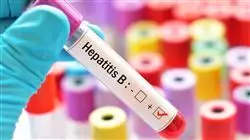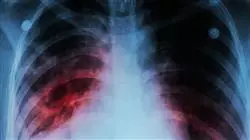University certificate
The world's largest faculty of medicine”
Introduction to the Program
A dynamic and comprehensive qualification for you to update your knowledge of the latest developments in blood-borne diseases in a 100% online format”

Highly aggressive blood-borne pathogens can cause serious consequences for the patient's health. These contagions occur when a healthy person comes into direct contact with the blood and/or body fluids of an infected person. Among the most common are Hepatitis (B and C), HIV/AIDS and Tuberculosis, three diseases that, in just two decades, have caused millions of deaths worldwide. However, continuous research in infectious diseases and medicine has established increasingly effective therapeutic guidelines and prevention strategies to clinically treat these infections.
In light of this, TECH has designed a novel and intensive program that precisely gathers all the latest developments in a 475-hour academic experience. The result is this Postgraduate Diploma in Blood-Borne Diseases in Clinical Practice, a dynamic and comprehensive course for physicians to delve into the advances in the epidemiology of infectious diseases, guidelines for multi-resistance, the latest vaccines and arbovirosis. It will also focus on the benefits of administering certain treatments and the recommendations for each case.
Over six months, our students will have unlimited access to the best theoretical, practical and additional content, designed by a teaching team versed in the subject that will also be at their absolute disposal to guide them throughout the program and resolve any of their doubts. So, through a 100% online academic experience at the forefront of the medical field, our students will be sure to update their knowledge from wherever they want, without schedules or face-to-face classes, and from any device with an Internet connection.
You will work intensively on updating your knowledge over 475 hours of the best theoretical, practical and additional material”
This Postgraduate Diploma in Blood Borne Diseases in Clinical Practice contains the most complete and up-to-date scientific program on the market. The most important features include:
- Case studies presented by experts in infectious diseases in clinical practice
- The graphic, schematic, and practical contents with which they are created, provide scientific and practical information on the disciplines that are essential for professional practice
- Practical exercises where self-assessment can be used to improve learning
- Its special emphasis on innovative methodologies
- Theoretical lessons, questions to the expert, debate forums on controversial topics, and individual reflection assignments
- Content that is accessible from any fixed or portable device with an Internet connection
If you are looking for a program that will bring you up to date with the latest developments in Hepatitis, HIV and Tuberculosis in a dynamic and exhaustive way in only six months”
The program’s teaching staff includes professionals from the sector who contribute their work experience to this educational program, as well as renowned specialists from leading societies and prestigious universities.
The multimedia content, developed with the latest educational technology, will provide the professional with situated and contextual learning, i.e., a simulated environment that will provide immersive education programmed to learn in real situations.
This program is designed around Problem-Based Learning, whereby students must try to solve the different professional practice situations that arise during the academic year. To that end, they will be assisted by an innovative, interactive video system created by renowned and experienced experts.
You will have unlimited access to the Virtual Campus where all the content will be hosted from the beginning of the academic program"

The best program in the current academic landscape to update your skills in multi-resistance and vaccine use"
Why study at TECH?
TECH is the world’s largest online university. With an impressive catalog of more than 14,000 university programs available in 11 languages, it is positioned as a leader in employability, with a 99% job placement rate. In addition, it relies on an enormous faculty of more than 6,000 professors of the highest international renown.

Study at the world's largest online university and guarantee your professional success. The future starts at TECH”
The world’s best online university according to FORBES
The prestigious Forbes magazine, specialized in business and finance, has highlighted TECH as “the world's best online university” This is what they have recently stated in an article in their digital edition in which they echo the success story of this institution, “thanks to the academic offer it provides, the selection of its teaching staff, and an innovative learning method aimed at educating the professionals of the future”
A revolutionary study method, a cutting-edge faculty and a practical focus: the key to TECH's success.
The most complete study plans on the university scene
TECH offers the most complete study plans on the university scene, with syllabuses that cover fundamental concepts and, at the same time, the main scientific advances in their specific scientific areas. In addition, these programs are continuously being updated to guarantee students the academic vanguard and the most in-demand professional skills. In this way, the university's qualifications provide its graduates with a significant advantage to propel their careers to success.
TECH offers the most comprehensive and intensive study plans on the current university scene.
A world-class teaching staff
TECH's teaching staff is made up of more than 6,000 professors with the highest international recognition. Professors, researchers and top executives of multinational companies, including Isaiah Covington, performance coach of the Boston Celtics; Magda Romanska, principal investigator at Harvard MetaLAB; Ignacio Wistumba, chairman of the department of translational molecular pathology at MD Anderson Cancer Center; and D.W. Pine, creative director of TIME magazine, among others.
Internationally renowned experts, specialized in different branches of Health, Technology, Communication and Business, form part of the TECH faculty.
A unique learning method
TECH is the first university to use Relearning in all its programs. It is the best online learning methodology, accredited with international teaching quality certifications, provided by prestigious educational agencies. In addition, this disruptive educational model is complemented with the “Case Method”, thereby setting up a unique online teaching strategy. Innovative teaching resources are also implemented, including detailed videos, infographics and interactive summaries.
TECH combines Relearning and the Case Method in all its university programs to guarantee excellent theoretical and practical learning, studying whenever and wherever you want.
The world's largest online university
TECH is the world’s largest online university. We are the largest educational institution, with the best and widest online educational catalog, one hundred percent online and covering the vast majority of areas of knowledge. We offer a large selection of our own degrees and accredited online undergraduate and postgraduate degrees. In total, more than 14,000 university degrees, in eleven different languages, make us the largest educational largest in the world.
TECH has the world's most extensive catalog of academic and official programs, available in more than 11 languages.
Google Premier Partner
The American technology giant has awarded TECH the Google Google Premier Partner badge. This award, which is only available to 3% of the world's companies, highlights the efficient, flexible and tailored experience that this university provides to students. The recognition as a Google Premier Partner not only accredits the maximum rigor, performance and investment in TECH's digital infrastructures, but also places this university as one of the world's leading technology companies.
Google has positioned TECH in the top 3% of the world's most important technology companies by awarding it its Google Premier Partner badge.
The official online university of the NBA
TECH is the official online university of the NBA. Thanks to our agreement with the biggest league in basketball, we offer our students exclusive university programs, as well as a wide variety of educational resources focused on the business of the league and other areas of the sports industry. Each program is made up of a uniquely designed syllabus and features exceptional guest hosts: professionals with a distinguished sports background who will offer their expertise on the most relevant topics.
TECH has been selected by the NBA, the world's top basketball league, as its official online university.
The top-rated university by its students
Students have positioned TECH as the world's top-rated university on the main review websites, with a highest rating of 4.9 out of 5, obtained from more than 1,000 reviews. These results consolidate TECH as the benchmark university institution at an international level, reflecting the excellence and positive impact of its educational model.” reflecting the excellence and positive impact of its educational model.”
TECH is the world’s top-rated university by its students.
Leaders in employability
TECH has managed to become the leading university in employability. 99% of its students obtain jobs in the academic field they have studied, within one year of completing any of the university's programs. A similar number achieve immediate career enhancement. All this thanks to a study methodology that bases its effectiveness on the acquisition of practical skills, which are absolutely necessary for professional development.
99% of TECH graduates find a job within a year of completing their studies.
Postgraduate Diploma in Clinical Infectious Diseases of Blood-borne Diseases
The Postgraduate Diploma in Clinical Infectology of Bloodborne Diseases is an academic program designed to improve the training of infectious disease specialists and provide them with the necessary tools to deal with a disease that, in some cases, can be fatal. The specialization focuses on one of the leading causes of infectious disease transmission, bloodborne transmission. In order to combat the spread of infectious diseases, it is essential for specialists to have a thorough knowledge of the modes of transmission and prevention. The Postgraduate Diploma in Clinical Infectology of Bloodborne Diseases of TECH Global University, allows students to delve into the clinical and epidemiological aspects of bloodborne diseases such as viral hepatitis, HIV, HTLV, and other infectious agents.
Specialize 100% online
At TECH Global University we understand the multiple occupations of your day to day life, that's why all our classes are taught remotely, so you can connect from anywhere. We are considered by Forbes as one of the best digital universities in the world, which accredits us to provide the best experience to our students. If you want to complement your study experience you can access our multimedia pills, online library and complementary readings that the university has provided for you. If you want to improve your skills in the field of infectious diseases, don't think twice and join the Postgraduate Diploma in Clinical Infectious Diseases of Bloodborne Diseases! A high quality online academic specialization program, led by the best professionals in the health sector and in collaboration with the most important research centers and universities in Spain and Latin America, start your path towards specialization and continuous improvement today!







